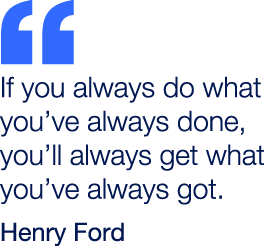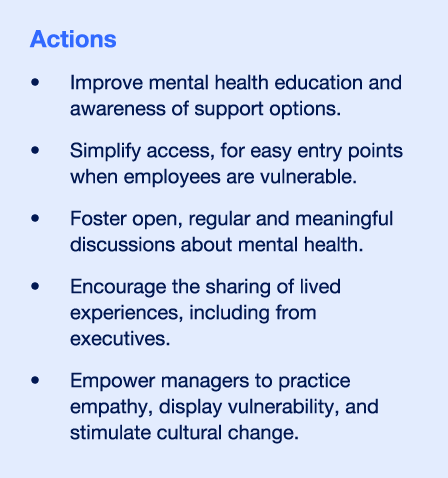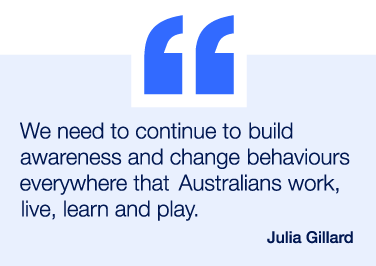Workplace mental health support: Why only a 5% uptake?

Insights.
Workplaces have changed beyond recognition over the past two years. Expedited by COVID-19, we have become more digitally enabled, embraced newfound flexibility through hybrid working, introduced new on-site safety measures to enable lockdown restrictions to be lifted, and there has been a greater emphasis on the wellbeing of employees as we navigate the blurred lines between our personal and professional lives.
As a result, employees are increasingly looking to their employers for better mental health support. Yet, as little as five per cent of employees use existing programs. Why?
We recently joined with PwC Australia to explore workplace mental health support and articulated the following three reasons for the suboptimal uptake:
- Not built into the culture;
- Solutions are not the right fit; and
- Poor past experiences.
This post shares an excerpt of the first reason from our joint report, Rethinking workplace mental health and wellbeing.
Excerpt from our Sonder-PwC Australia report
This report explores three reasons for the low uptake of workplace mental health support.
Reason one: it’s not built into the culture
One in five Australians will experience a mental health challenge at some point in their lives. We expect this statistic to be exacerbated by a range of pandemic-related factors, including isolation, social distancing, restricted movement, sudden job loss, homeschooling and lockdown uncertainty. All of which impacts employee wellbeing and the ability to be productive.
However, most employees do not use workplace support programs – because it is not built into the culture – there is a barrier to access, and a stigma around it.
Awareness and accessibility
When employees need mental health support, few know how or where to access it, even when workplaces have these supports in place. The range of options available can be complex and disjointed, leaving employees wondering, “which one is right for me?”.
This low ongoing awareness is illustrated by a 2020 survey of frontline doctors at a tertiary care hospital in NSW. The 235 responses showed that more than 50 per cent of doctors did not know how to access their own EAP.

Stigma and discrimination
Seventy-four per cent of Australians who are living with a mental illness have experienced stigma.
Australian workers are often subject to stigma and discrimination when they experience a mental health challenge, access support, and return to work. This is because the ability to have meaningful mental health conversations is not built into the culture. RUOK posters, combined with lunchroom talk about yoga and mindfulness apps, is not enough.
This is exacerbated by a lack of understanding by those around them. Most colleagues and managers have not received mental health first aid training, or more basic skills training to know what signs to look for, how to ask the right questions, or support with compassion an employee experiencing challenges.

An integrated approach to mental health in the workplace should connect all business functions. Work health and safety (WHS), people and culture, information technology, operations, and all other functions should work together in a strategic, holistic approach. Complement this by building skills for empathy, emotional intelligence, diversity and inclusion, mental health and wellbeing support, as well as visible role modelling and a culture of accountability.
Reducing stigma and driving cultural change requires visible commitment from the top. Business leaders need to encourage open and honest conversations without fear of retribution or disadvantage. Leaders who show vulnerability and tell their own stories also create safe spaces for others to speak up and feel heard. This can have a positive impact on trust and engagement and “goes a long way toward reducing the stigma and setting the tone for transparency”.

Want to learn more?
To read the full Sonder-PwC Australia report, please click here. For more information about how Sonder can help you rethink your workplace support, we invite you to contact us here.
About Sonder
Sonder is an Active Care technology company that helps organisations improve the wellbeing of their people so they perform at their best. Our mobile app provides immediate, 24/7 support from a team of safety, medical, and mental health professionals - plus onsite help for time-sensitive scenarios. Accredited by the Australian Council on Healthcare Standards (ACHS), our platform gives leaders the insights they need to act on tomorrow's wellbeing challenges today.
Related posts
There's so much more to share
Sonder is reimagining health, safety and wellbeing support. Sonder proves human centric care leads to earlier intervention. Sonder impacts one person at a time to drive meaningful change across an organisation. Sonder understands people and how to support them.

